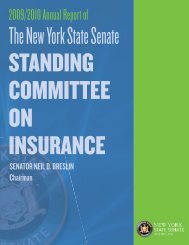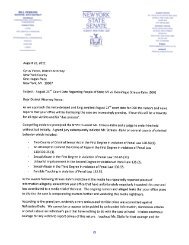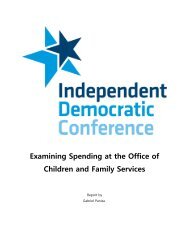Crime Committee Report e.indd - New York State Senate
Crime Committee Report e.indd - New York State Senate
Crime Committee Report e.indd - New York State Senate
You also want an ePaper? Increase the reach of your titles
YUMPU automatically turns print PDFs into web optimized ePapers that Google loves.
2009-2010 VETOED BY GOVERNOR Paterson<br />
S.4405-A<br />
HASSELL-THOMPSON/A 6532B Ortiz<br />
<strong>Crime</strong> Victims Transportation Reimbursement<br />
Under existing law, the <strong>Crime</strong>s Victims Board (CVB) is authorized to make awards to cover<br />
the transportation costs associated with a crime victim attending a “necessary court appearance<br />
in connection with the prosecution of such crimes.” The Governor’s Office interpreted this<br />
language to mean that the prosecutor determined what is necessary and what is not necessary.<br />
The bill intended to expand the definition of the term necessary to allow the crime victim to<br />
obtain transportation reimbursement for the entire prosecution of his or her case. That is, the<br />
crime victim would be eligible for reimbursement for transportation for any proceeding between<br />
arraignment and sentencing, as well as parole hearings. The rationale of the bill was that<br />
the crime victim should have an absolute right to attend each and every proceeding regarding<br />
the prosecution of his or her case. The Governor’s Office vetoed the bill stating that financial<br />
cost was a major factor for veto and that the staff of CVB was ill-equipped to handle the added<br />
paperwork.<br />
S.8022 HASSELL-THOMPSON /A 11330 Aubry<br />
Requires Detailed <strong>Report</strong>s on Impact of Prison Closings<br />
Vetoed 8/13/10 memo 6767 of 2010<br />
Existing law requires the department of correctional services (DOCS) to report security staffing<br />
information to the legislature each year. This bill expands the existing report by requiring<br />
additional information about security staffing ratios, bed capacity and the double-bunking and<br />
double-ceiling of inmates be included in such report. The bill also requires that such report<br />
be provided to the legislature by February 1st of each year. Additionally, this bill modifies the<br />
prison closure notice requirements of section 79-a of the correction law by requiring that a<br />
report, with specific information regarding the impact of any proposed closure, accompany<br />
the closure notice. Each year a prison closure has been proposed by the Governor, DOCS has<br />
provided the legislature with a report detailing the reason for the proposed closure and the anticipated<br />
impact. This bill will codify this practice and require DOCS to formally report on how<br />
a prison closure will impact staff, security, inmates, available bed capacity, and programs. This<br />
will ensure that the legislature continues to be provided with the information needed to make<br />
informed decisions regarding proposed prison closures.<br />
S.4687 HASSELL-THOMPSON, DIAZ, KRUEGER / A 08012 Jeffries<br />
<strong>State</strong> Human Rights Relief for Ex-Offenders – Reentry<br />
Vetoed 8/13/10 memo 6756 of 2010<br />
The purpose of this bill is to ensure that persons illegally discriminated against by a public<br />
employer due to a prior criminal conviction unrelated to the employment sought is able<br />
to seek redress with the <strong>New</strong> <strong>York</strong> <strong>State</strong> Division of Human Rights. <strong>New</strong> <strong>York</strong> <strong>State</strong>’s Human<br />
Rights Law §297 enumerates the remedies available to a person with a claim of unlawful<br />
discrimination. This provision states that, “Any person claiming to be aggrieved by an unlawful<br />
discriminatory practice may, by himself or herself- make, sign and file with the division a<br />
verified complaint.” Inexplicably, under a separate provision of <strong>New</strong> <strong>York</strong> <strong>State</strong> law, one class of<br />
persons, those discriminated against by public agencies on the basis of their criminal record,<br />
have their remedies limited. Under Section 755 of the Correction Law, individuals denied employment<br />
by a public agency because of their criminal record have only one remedy available<br />
to them - an Article 78 proceeding in state court. However, individuals wrongly denied employment<br />
by a private employer are able to file a complaint with the Division of Human Rights.<br />
There is no persuasive reason that only people who are discriminated against by a public<br />
agency because of their criminal record should be limited to fewer options.<br />
Standing <strong>Committee</strong> on <strong>Crime</strong> Victims, <strong>Crime</strong> and Correction | 2009-2010 <strong>Report</strong> 57


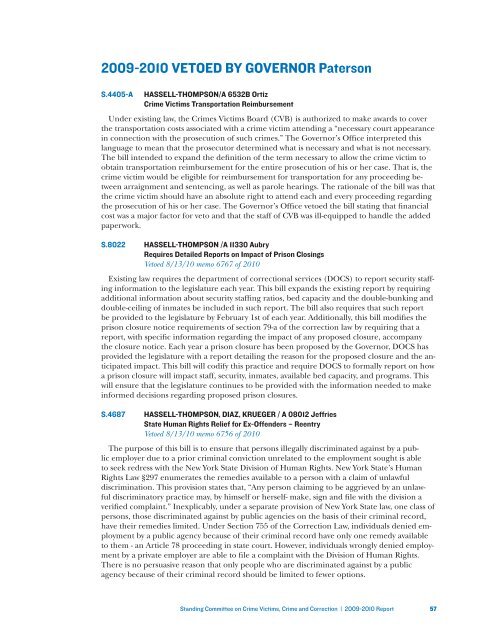
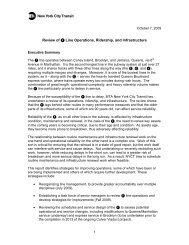



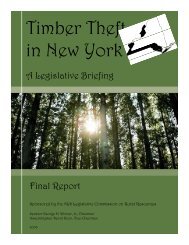

![[PDF] Proposed MTA Capital Program - New York State Senate](https://img.yumpu.com/24854139/1/190x245/pdf-proposed-mta-capital-program-new-york-state-senate.jpg?quality=85)



